This post about safe decaffeinated coffee brands is sponsored by Women Online. All opinions are my own.
If you love coffee but need to give up caffeine, you may choose to look for decaffeinated coffee. But, what is decaf coffee, and how healthy is it, anyhow? Is decaf coffee bad for you? If this is a concern for you, the Clean Label Project will help you choose safe decaffeinated coffee brands for better health!
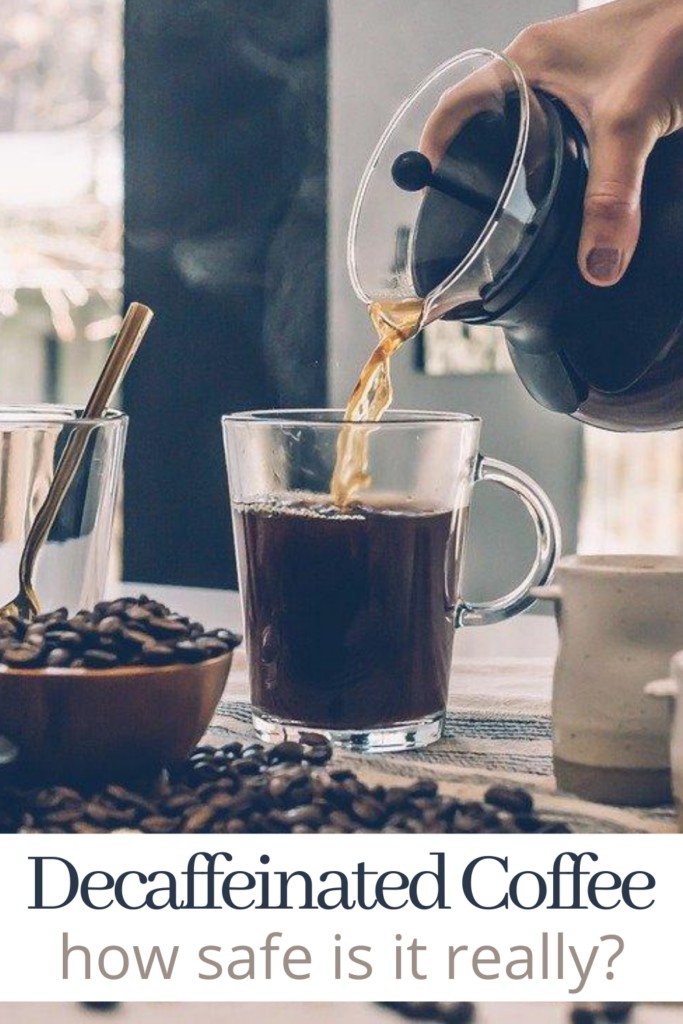
Table of Contents
What is the point of drinking decaf coffee, anyhow?
For serious coffee lovers, decaf coffee may seem like sacrilege. Why drink coffee without that kick from the caffeine, right? But, there are lots of people for whom caffeine poses a real problem.
Drinking coffee while pregnant often means ditching the kick of your caffeinated beverage. When I was pregnant with both my kids, what I ate and drank became a HUGE concern for me. It’s when I started drinking organic milk and gave up caffeine. It was an eye-opening time in my life.
People who are elderly or have heart problems often have to give up caffeine as well.
And some people just don’t respond well physically to too much caffeine but love the flavor of the coffee itself. Rather than give up their favorite morning cup of coffee completely, they prefer to look for decaffeinated coffee brands instead.

✯Don’t want to miss the next post?✯
Follow Turning the Clock Back on Facebook | Twitter | Pinterest
Or join the private Facebook group for simple tips on going green!
How do they make decaffeinated coffee?
How to you get the caffeine out of a cup of coffee? And how safe is this process for the often health conscious, possibly pregnant or elderly people, who drink it every day?
There are two methods for decaffeinating coffee. I won’t go into too many details and get all science-y on you. Suffice it to say that there is a water-based process and a chemical-based process.
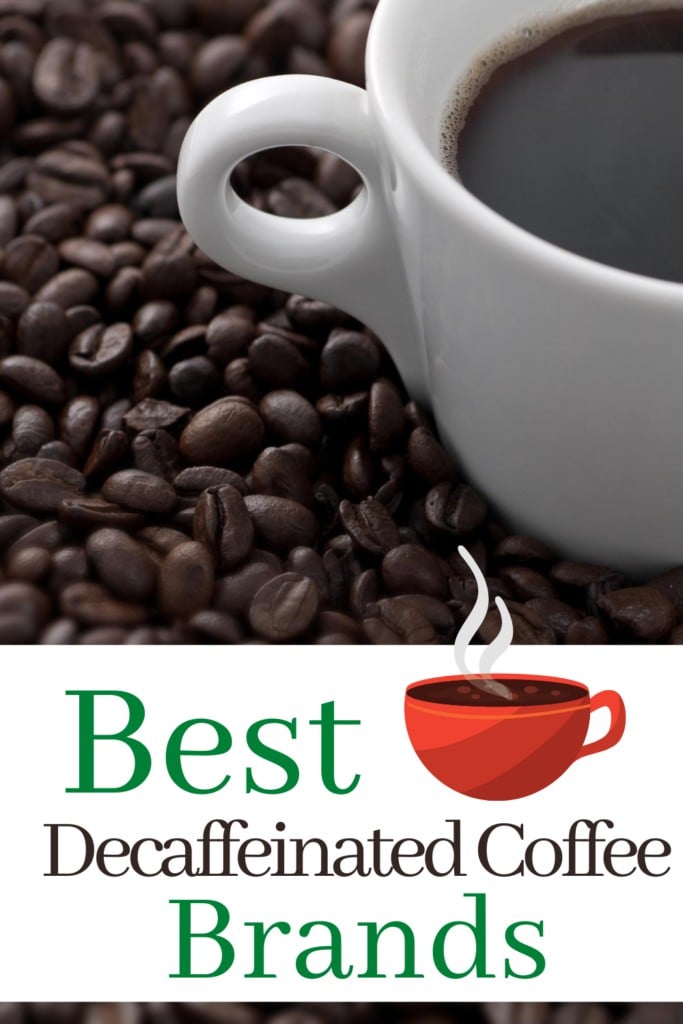
Is decaf unhealthy?
Well, one factor I would take into consideration is how the caffeine is removed. Many brands use methylene chloride to remove the caffeine from coffee. And that methylene chloride can actually stay IN THE COFFEE YOU DRINK in small amounts.
Consumers deserve to know if they are getting chemicals in their coffee. And that is where the Clean Label Project comes in!
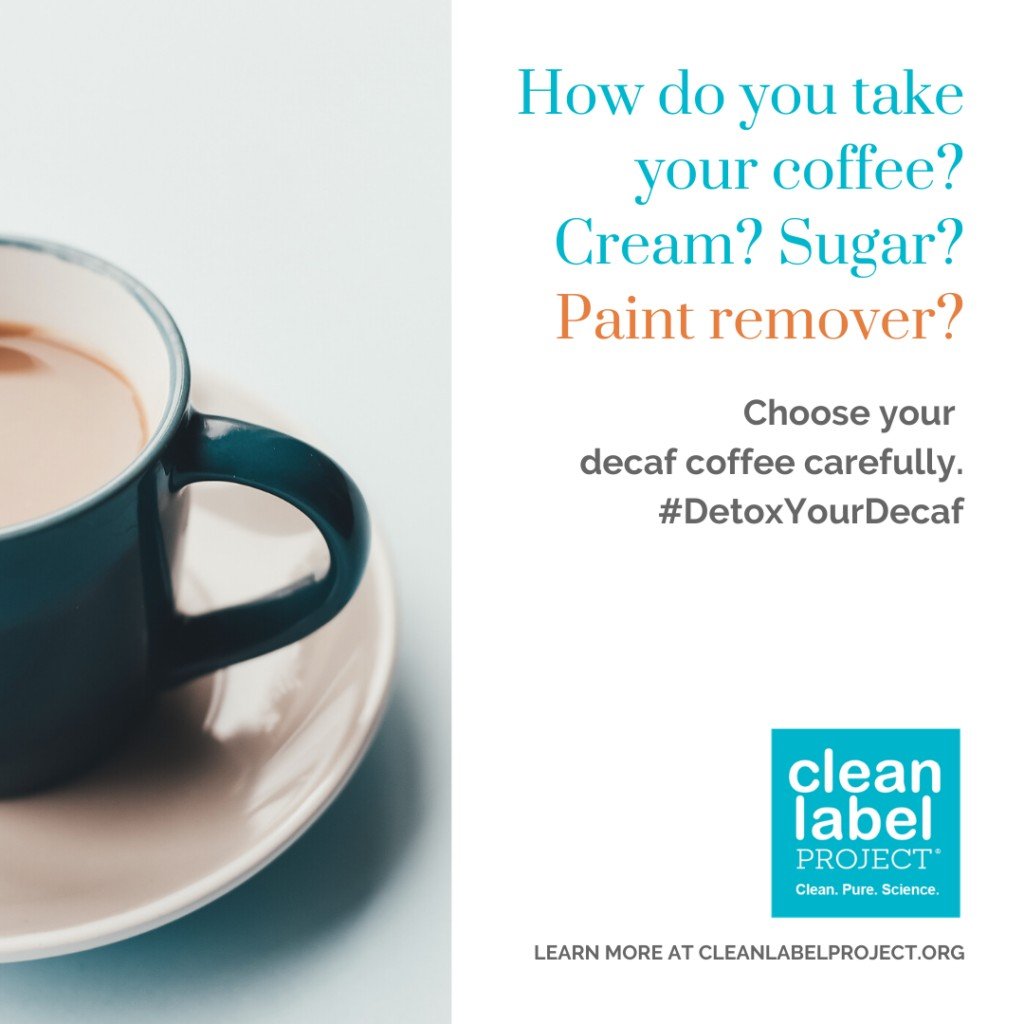
How to choose safe decaffeinated coffee for better health
So, you want to drink decaf coffee but don’t want harsh chemical residues in it. How do you choose the best decaf coffee?
Start reading the label on your coffee! Look for claims on the packaging like solvent-free, chemical-free, Swiss-water, or certified organic. (YAY for organic coffee! It’s high on my list of things I always buy organic!) The processes I just listed don’t use harsh chemicals to decaffeinate their coffee.
Want your favorite coffee brand to share more info on how they decaffeinate their coffee? ASK THEM! Reach out via email, or social media, or give them a phone call. Talk to them about your search for the healthiest decaf coffee and ask for more information.
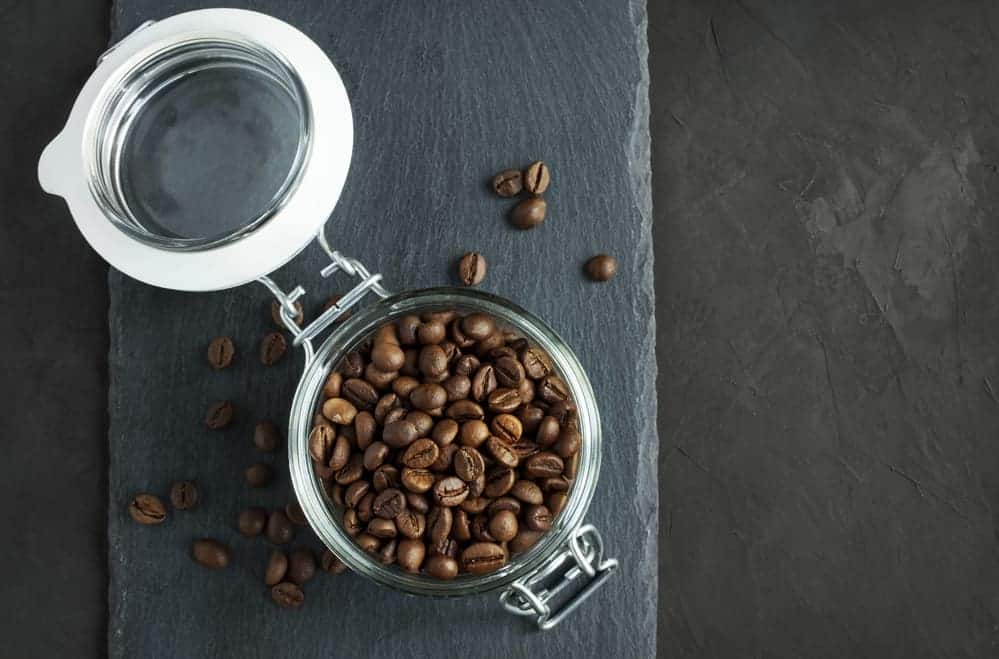
Safe Decaffeinated coffee brands tested by the Clean Label Project
There are several naturally decaffeinated coffee brands on the market. You just need to find them. What is the best decaffeinated coffee? Well, there are a lot of variables to consider. However, if the presence of methylene chloride in your coffee concerns you, here are the brands that were tested by the Clean Label Project and found to NOT contain this chemical:
- ALLEGRO COFEE Decaffeinated Organic French Roast
- ARCHER FARMS Decaffeinated House Blend
- CARIBOU COFFEE Decaffeinated Caribou Blend
- COMMUNITY COFFEE Decaffeinated Café Special
- DAZBOG COFFEE Decaffeinated French Roast
- DUNKIN’ DONUTS Decaffeinated Medium Roast
- FOLGERS Decaffeinated Classic
- ILLY Decaffeinated Illy Blend
- KICKING HORSE COFFEE Decaffeinated Dark
- NESCAFÉ Decaffeinated House Blend
- PEET’S COFFEE Decaffeinated Major Dickason’s Blend
- STARBUCKS Decaffeinated House Blend + Decaffeinated Caffè Verona
- THE ORGANIC COFFEE CO. Decaffeinated Organic Gorilla
- TIM HORTONS Decaffeinated Medium Roast
These brands will definitely be on my list of brands to choose from when I buy decaffeinated coffee! KNOW WHAT YOU ARE BUYING! Clean Label Project has filed lawsuits against four national brands for false and misleading advertising and labeling.
These brands claim that their decaffeinated coffee products are “pure and natural.” In contrast, Clean Label Project’s study showed that methylene chloride was detected in the decaffeinated coffee products of these brands.
Keep in mind that if you do an online search for ‘the best decaf coffee consumer reports, you will get ratings based on taste, sustainability, and many other factors. Only one of which is how the coffee is decaffeinated. So, keep this in mind as you search for the best brand of decaf coffee!
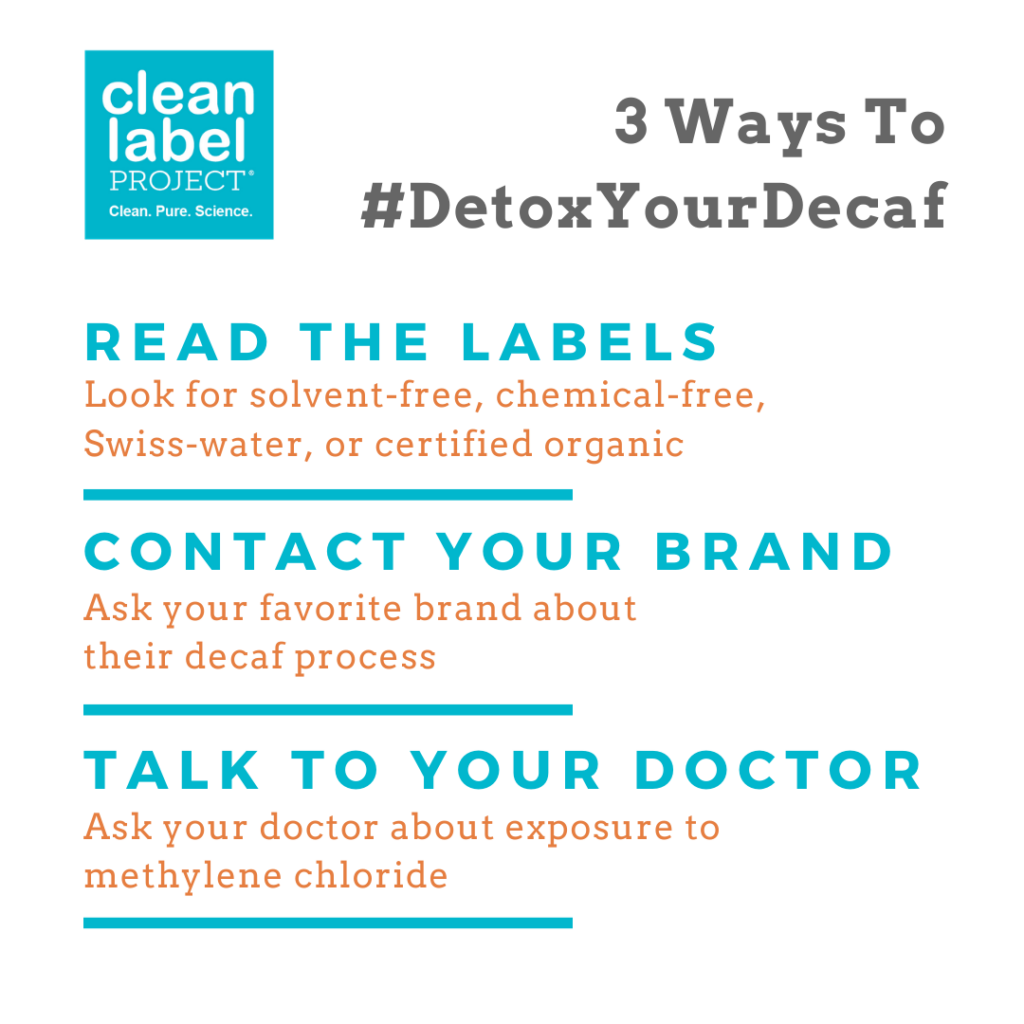
How can you get involved?
If you are concerned about your exposure to methylene chloride, talk with your doctor. And if you want to join the movement for healthy decaf coffee, head over to the Clean Label Project and join the movement!
Another great way to get involved is to SHARE this post with friends and family. Or, click the share button for social media sharing and use the hashtag #DetoxYourDecaf when you do it.

Like these coffee tips? Read one of these posts, too!
Want more information about choosing the best coffee? Read one of these posts, too:
- How to Vote With Your Dollar on National Coffee Day! National Coffee Day is September 28th. Read on for tips on choosing the best coffee!
- 5 Reasons to Choose Fair Trade Products Learn why Fair Trade coffee should be on your shopping list.
If you have a serious coffee habit and want to do something sustainable with your leftover coffee grounds, check out my post on Ways to Reuse Coffee Grounds Around the House.
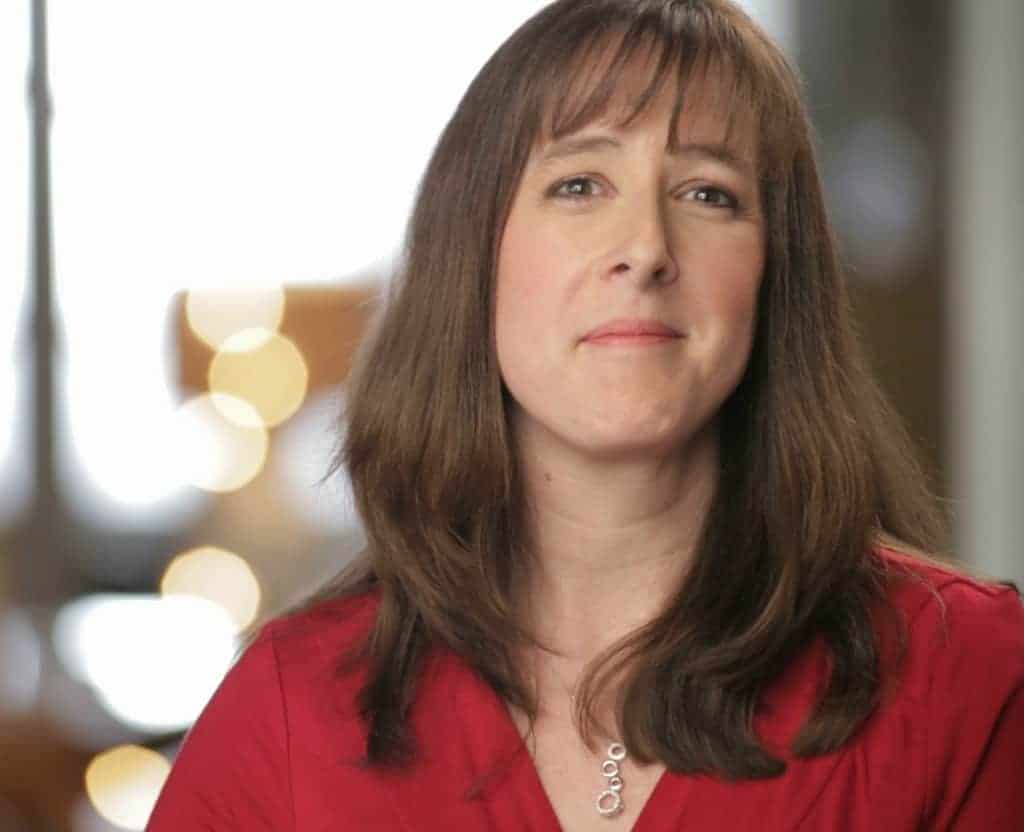
Diane is a professional blogger and nationally certified pharmacy technician at Good Pill Pharmacy. She earned her BS in Microbiology at the University of New Hampshire and has worked in cancer research, academics, and biotechnology. Concern over the growing incidence of human disease and the birth of her children led her to begin living a more natural life. She quickly realized that the information she was learning along the way could be beneficial to many others and started blogging and freelance writing to share this knowledge with others. Learn more about her HERE.

Thank you! This was very informative! I’ll look up the Clean Label Project!
So glad you found the post helpful!
Thank you! I am just beggining to remove caffiene from my lifestyle and this list is a life saver!!
Glad I could help. Please check out the Clean Label Project website for updated information and more details about how they determined their list
I didn’t see the Sugar Cane method mentioned.
Ethyl Acetate which is derived from the cane may sound
like some harsh chemical but it’s not. You may want to look into it 🙂
Thanks for the information and I will look into more fully.
How would an individual determine which product is utilized by national restaurant chains (other than those specifically listed in the article, e.g., Mc Donald’s, Wendy’s, etc.), except by contacting the Consumer Affairs Dept. of each corporation?
You can try calling the individual store and asking? Not sure if they would be open about that but can give it a try.
A eye opening article. I started looking for other roasters that used the Swiss Water method of decanting coffee and found a great roaster. You might check out Fresh Roasted Coffee LLC. Most of their decaf coffee uses the Swiss Water method. There coffee is excellent.
Thanks for the tip!
I did not see Kirkland decaf dark coffee. It is made by Starbucks, so is it safe or not?
Thank you!!
I suggest you email the brand to be sure.
Signature Brand has residual Methylene Chloride.
https://cleanlabelproject.org/are-there-chemicals-in-your-decaffeinated-coffee/
Any further info on the lawsuits? Its mind boggling than our FDA would approve a known carcinogen as a food ingredient, even residual. But then they told us the experimental vaccines were safe too. I trust no processed food in America anymore except that which I research, to the extent that I can. FYI, don’t drink coffee in paper cups at your favorite coffee place, it may be coated with plastic. An Epoch TImes article said that 80000 plastic microparticles may be ingested from the hot beverage. Ask for a mug.
I try to always bring my reusable mug when I go. Never hurts to do some research.